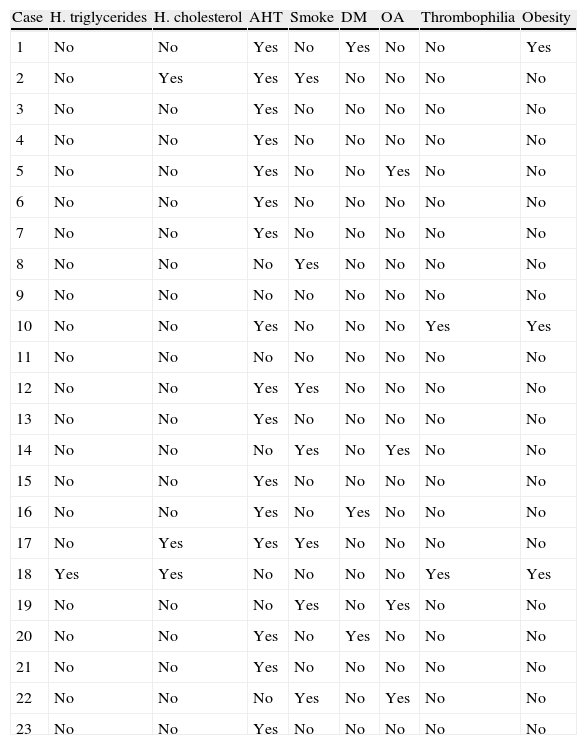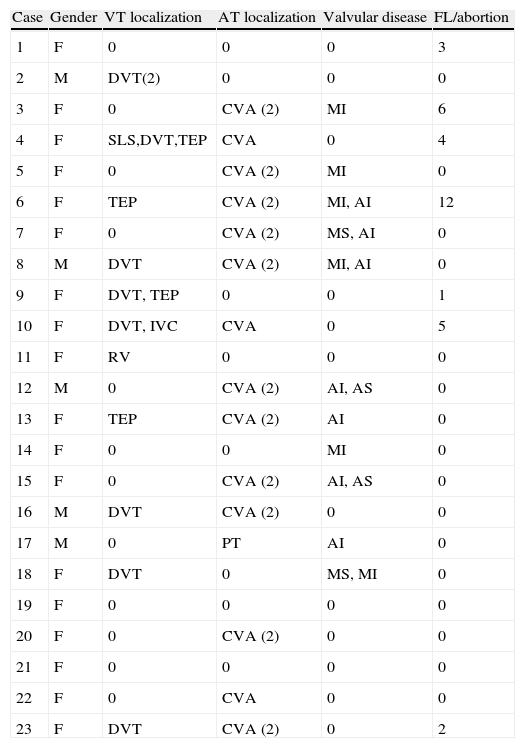Livedo reticularis racemosa and cerebrovascular lesions characterize Sneddon's syndrome. We report 23 patients with livedo racemosa and describe the association with thrombotic events. Our objective was to determine whether livedo racemosa may be an independent clinical marker for the development of thrombotic events in patients who test negative for anti-phospholipid antibodies.
MethodsTwenty-three patients with widespread livedo racemosa were studied. None of the patients were positive for anti-phospholipid antibodies. The clinical protocol included a register of thrombotic events, fetal death or miscarriages, hypertension, and valvular heart disease. Cerebral MRI and echocardiography were systematically performed in all patients.
ResultsNineteen patients (82.60%) had thrombotic events. Fifteen (65.21%) had arterial thrombosis and eleven (47.82%) presented venous occlusions. Seven patients (30.43%) had both arterial and venous thrombosis. Fetal losses were recorded in seven cases (30.43%), with a total number of 33; five patients had 3 or more fetal losses. Eleven out of 23 patients (47.82%) had valvular heart disease. Arterial hypertension was detected in 16 (69.56%) patients. Four patients did not have thrombotic events but had other clinical manifestations. After anti-coagulation therapy was withdrawn, a new thrombotic event was observed in 9 out of the 14 treated patients (64.28%).
ConclusionsLivedo racemosa seems to be a good clinical marker for the detection of hypercoagulable states even in the absence of anti-phospholipid antibodies or other known biologic markers of thrombosis. Long-term anti-coagulation is probably warranted in patients with livedo racemosa and a previous thrombotic event.
El síndrome de Sneddon consiste en la asociación de lívedo reticularis racemosa con lesiones isquémicas cerebrovasculares. En el presente artículo describimos un grupo de 23 pacientes con lívedo reticularis racemosa y su asociación con episodios trombóticos para determinar si ambas variables clínicas están asociadas a pacientes con anticuerpos antifosfolipídicos negativos.
Pacientes y métodoSe estudiaron 23 pacientes con livedo racemosa generalizada, ninguno de los cuales presentaba positividad para anticuerpos antifosfolipídicos. El protocolo clínico de estudio incluyó un registro de episodios trombóticos, abortos o muertes fetales, hipertensión y enfermedad vascular cardiaca. Se practicó sistemáticamente a todos los pacientes una RM cerebral y un ecocardiograma.
Resultados19 pacientes (82,6%) presentaron un episodio trombótico; 15 (65,21%) arterial y 11 (47,81%) venoso. Siete (30,43%) presentaron trombosis en ambos territorios. En 7 casos (30,43%) se registró una pérdida fetal con un número total de 33 episodios; 5 pacientes tuvieron 3 o más pérdidas fetales. En 11 de 23 pacientes (47,82%) se apreció xxx cardiaca y en 16 (69,56%) se detectó hipertensión arterial. Cuatro pacientes no tuvieron episodios trombóticos, pero sí otras manifestaciones. Tras la suspensión de la anticoagulación, 9 casos presentaron un nuevo episodio de trombosis.
ConclusionesLa lívedo racemosa parece ser un buen predictor clínico de un estado de hipercoagulabilidad incluso en ausencia de anticuerpos antifosfolipídicos, por lo que probablemente estaría indicado tratamiento anticoagulante a largo plazo en pacientes con episodios trombóticos previos.
Artículo
Comprando el artículo el PDF del mismo podrá ser descargado
Precio 19,34 €
Comprar ahora










